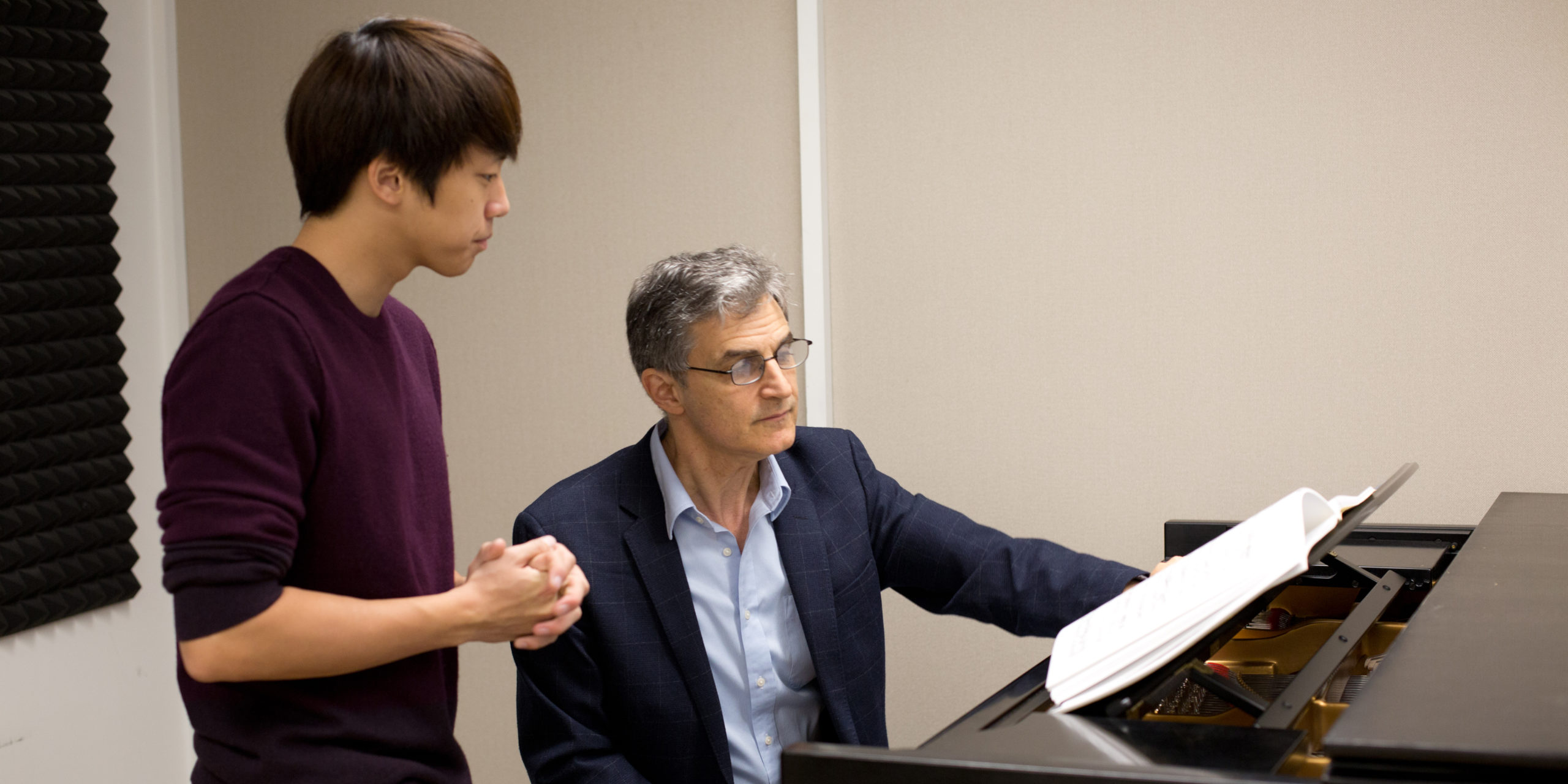Opera Explained: What Happens in a Voice Lesson?

By: Suzanne Whitney
A voice lesson can seem mysterious for folks who are not singers or who haven’t studied voice with a teacher before. There are many questions which might come up. Will one lesson make me a star? Why do I need them if I sound great singing in my bathroom? What is with all the mi-mi-mi’s and vocal acrobatics? As part of our Opera Explained series, I’ve interviewed the 2020-21 Opera Colorado Artists in Residence to lift the veil. Here they share the basics of what happens behind the closed doors of a voice lesson. So, let’s dive into this murky subject together and clarify the why, what, and how of voice lessons.
Why are Voice Lessons Important?
The Artists in Residence each said one big reason voice lessons are important is they needed a pair of ears they can trust. This is because it is impossible for a singer (or speaker for that matter) to hear their voice as others do. Think about a time when you heard your recorded voice. It doesn’t sound as you expect it to and it can feel frustrating. Part of a voice teacher’s job is to assess how a singer will sound to an audience. Then the teacher helps the singer identify and match the physical sensation of singing to a healthy, beautiful sound. Tenor Devin Eatmon added that voice lessons are important throughout your life, not just as you are first learning. “Your body is constantly changing and as you age, your voice changes. You need someone on your team who knows your voice and the milestones where change can occur to help you grow and keep a healthy vocal technique.”
Breaking Down the Voice Lesson
A voice lesson can include many types of exercises, language work, performance preparation, history of opera, and even the occasional teacher/student therapy session when things are feeling particularly hard. Although lessons can be different depending on the teacher and the student’s level, today we are breaking them down into three basic sections:
Preparation
Singers don’t arrive for a lesson without putting in some work beforehand. They also need to make sure they have the right tools on hand. Here is what the Artists in Residence recommend you bring to each lesson:
- A water bottle
- A pencil AND eraser
- Three copies of your music (one for you, one for your teacher, one for your pianist)
- Voice recorder or phone with recorder built in
- Optional: Shoes for an upcoming performance (singing feels different in heels!)
Now that we’ve got all we need in our bags, soprano Catherine Swindle and baritone Thomas Lynch take us through what preparation they do before their lessons.
Catherine Swindle, soprano

I approach each lesson with what I plan to work on in mind. I always warm up a little before the lesson and I will tailor what I do to the repertoire I want to work on. For example, if I’m working on coloratura (a style of singing that involves fast moving passages) in the lesson, I will sing some exercises that move. If I am bringing in a brand-new piece I will, of course, learn all the notes, words, and music before the lesson. I also record all of my lessons, so I usually listen to the previous lesson or one where we worked on the repertoire I’m planning to bring to the lesson.
Thomas Lynch, baritone

My preparation for a lesson starts as soon as the previous lesson ends. I record all my lessons, so the first thing I do is listen to the recording and find ways to put what I’ve learned into daily practice. I also work through the assigned repertoire daily in preparation for the next lesson. If I am preparing a role, I always start with the text, especially if it is a different language. Then I add in the music. I find the tricky spots that I need help with as I practice. Those are the questions I will take to my teacher in our next lesson. Other than that, I do a lot of hydrating!
Learn more about a singer’s health and why hydration is important>>
Vocal Warm Ups and Exercises
Although you heard from our artists that they warm up before lessons, most teachers spend time warming up their students and working on vocal exercises to teach healthy vocal technique. Vocal exercises allow students and teachers to strip away many of the complicating factors within a singer’s music—like language, acting, and even bad habits—and focus on singing healthfully.
Kendra Broom, mezzo-soprano

During a warm up, I expect to find exercises that work the entire range. We start small and then expand the range. I also expect a teacher, at least initially, to explain why we are doing an exercise. I think it is important to know if we are working on breath or vowel placement or whatever it is that needs improvement. Vocal exercises are not universal, every exercise isn’t going to work for every singer. So, the teacher needs to offer vocal exercises that will help each singer through their tricky technique spots.
Isaiah Feken, baritone

For me, there are two types of exercises during a voice lesson: one is to warm up the voice and the other is more prescriptive—seeking to solve a problem. When warming up it is good to remember that the whole vocal apparatus is based on stretching. Imagine singing a high note is like bending over and touching your toes. If you roll out of bed and try to touch your toes without stretching, you might have a hard time! Same goes for singing. In a lesson, I expect to move through the different parts of the vocal range and to warm-up the rest of the body. Singing is a full body experience, there are many pieces to warm up.
Next, the teacher will include prescriptive exercises. A teacher might be a little sneaky and choose to warm you up on a phrase that replicates a difficult phrase in your repertoire. It lowers the stakes and the experimentation allows you to succeed where you had struggled in the actual piece of music.
Check out performances by the Artists in Residence in our digital, educational programs>>
Repertoire Work
The final section of the voice lesson we will learn about is repertoire work. This is the time the teacher, singer, and often a collaborative pianist will work on pieces of music that the singers are preparing for an audition, performance, or recording. As Catherine mentioned above, this does not mean learning the words or notes of a piece. This is time spent working with a teacher to find the best and healthiest way to perform the piece.
Devin Eatmon, tenor

With my main voice teacher, I will sing through a piece, but we will quickly relate it back to vocalises or vocal exercises. For example, I (like many tenors) have struggled with a specific phrase in Rudolpho’s aria “Che gelida manina” from La bohème. So, my teacher and I will practice it in a lower key or practice it on one consonant, which simplifies it and allows me to focus until we have a well sung phrase. This also helps remove bad habits I might have. Often working on repertoire in a lesson can involve working through bad habits in older repertoire. It can take hours and hours of reworking to replace bad habits with a new approach. Even when we are focused on repertoire in a lesson, we treat every piece as a vocalise. Skipping ahead to the full performance of an aria can create some road blocks down the line.
Timothy Madden, bass-baritone

I feel lucky that Daniel Belcher (the voice teacher for singers during their time as Opera Colorado Artists in Residence) is my voice teacher all the time. When I take repertoire in, Danny has so much experience as a professional singer and he helps with the intangibles of repertoire. Things like style and minute details that you can’t pick up from textbooks or recordings. As we work through my repertoire, the lessons are almost self-guided at this point in our relationship. I will sing through something, he will ask how I felt about it. The lesson becomes a discussion of what I think, as well as Danny’s expertise. That rapport feels really good and is the type of teacher/student relationship that works best for me.
Before we clear up a couple misconceptions about voice lessons, we can’t forget the unsung heroes of the voice lesson: the collaborative pianist or accompanist. Stephen Variames is the coach/accompanist among our Artists in Residence and here he shares what it is like to play for a voice lesson.
Stephen Variames, coach/accompanist

As a pianist and coach I often show up for a voice lesson and have some music thrown at me! When I am working with a student, and we are preparing for a performance we have music that we work on together. In lessons, I often play the same phrase a number of times, so the student can work through a trouble spot with the support of the piano. I really look forward to new repertoire in lessons. Sitting in voice lessons has helped me learn so many new things and a lot of the repertoire I do know is because of that experience.
Keep an eye out next month for a feature on Stephen and more about his life as a pianist, coach, and composer.
Myth Busters: Voice Lessons
There are many misconceptions about voice lessons floating around there, so the Artists in Residence tackle a few of those here.
Myth: One voice lesson can make you a star.
Truth: As in any sport or craft it takes time and practice and expert instruction to become a master. As much as we would love to have a miraculous breakthrough, voice lessons are necessary throughout a singer’s lifetime. Regular lessons with a great teacher and long-term dedicated practice are ultimately what make an opera star.
Myth: The pianist is there to teach you notes
Truth: Working with a pianist is about collaboration. They are not there to plunk out notes for you or to be your “back-up music.” The two of you are creating music together as equal partners. The real magic happens when you work as a team.
Myth: Voice lessons are intimidating.
Truth: There are many different teaching styles, but no matter the style, a voice teacher’s job is to help you learn. Taking a lesson and really digging into the music helps build up your tool kit of skills and knowledge. You may come away loving music and singing even more because of the time spent learning. Don’t be afraid to learn something new!
Whether you are heading in for your first lesson or you’ve been studying for years, you will make the most progress if you have an open mind and willingness to make mistakes. It can feel vulnerable, but that vulnerability can open the door to making something beautiful.
—
Have you taken voice lessons before? What was your experience like? Would you like to hear more from our Artists in Residence? Let us know in the comments below.



Would love to read an article on “A day in the life of an Artist in Residence.
What a great idea! Thanks, Lillian.